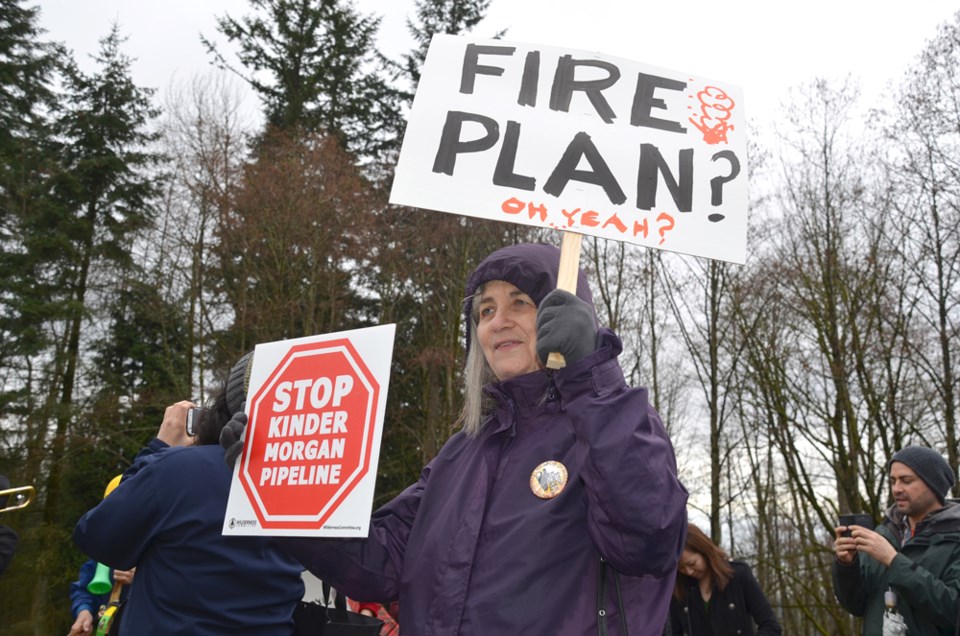More than 50 anti-pipeline activists braved the rain last week to protest the proposed Kinder Morgan tank farm expansion.
The rally was held at the corner of Gaglardi Way and Burnaby Mountain Parkway, the intersection that provides the only escape routes off Burnaby Mountain.
“We feel the issue of the tank farm safety risk has been ignored and swept under the table, and we thought it was time we bring this to the attention of a broader public,” said organizer Andrew Larigakis.
As part of the Trans Mountain expansion project, which seeks to twin the Edmonton-to-Burnaby pipeline, an additional 14 new tanks will be built, bringing the total to 26.
Protesters worry that should there be a fire, residents and SFU students will be trapped on the mountain for days and will be exposed to dangerous chemicals. When the NOW first reported on this issue in spring of 2015, then-chief safety officer Terry Waterhouse said there was no plan except to “shelter in place.”
“It’s a very ugly scene. The fire department has identified this area as a high life risk area. This is very serious ... It’s a huge failure of our regulatory process,” said Larigakis. “Kinder Morgan’s been given a free pass on fire, and it seems to me, a free pass on seismic. There’s no real seismic study that’s been done. I think there’s a good reason for that. These tanks would just crack and leak fuel if there’s a significant earthquake. It only takes one.”
But a new report concludes the fire risk at the tank farm is “extremely low” and falls in line with the criteria set out by the Major Industrial Accidents Council of Canada.
On March 1, as part of the NEB’s conditions, Trans Mountain filed an updated risk assessment for its Burnaby terminal.
The report, prepared by Genesis Oil and Gas Consultants, includes: the potential consequences of a pool fire, boil-over, flash fire and vapour cloud explosion; the cumulative risk based on the total number of tanks in the terminal; the effect of seismic activity on the storage tanks; the effect of sulphur dioxide and carbon monoxide on people; and risk mitigation measures.
Jamie Kereliuk, Trans Mountain’s director of emergency management, said he’s confident in saying the facility is very safe.
“I think our operation record backs up this. In over 60 years, we haven’t had any storage tank fires at the terminal,” he told the NOW.
Kereliuk was quick to point out the risk assessment is unmitigated, meaning Genesis assessed the property with no mitigation procedures in place.
He said Trans Mountain has gone above and beyond the regulatory requirements, including enhancing its emergency response plans. Those plans include a larger fire-water reservoir, new high capacity fire-water pump and foam systems, early fire detection systems, remote-activated fire suppression systems and a mobile firefighting system that includes a foam trailer, cannon and firefighting equipment.
“This is a commitment we’ve made to our community and to our stakeholders, to make sure that we have the very best systems in place,” Kereliuk added.
The director called a boil-over event “not a credible scenario.”
Kereliuk said to avoid such a disaster, the new tanks will be designed to prevent the accumulation of water, which is necessary to cause a boil-over. The tanks will be fitted with fixed automated full-surface fire-suppression systems and back-up mobile systems, according to the report.
Genesis Oil and Gas noted a boil-over would take at least five hours to develop, which gives crews enough time to implement a tactical response plan to suppress or extinguish a fire, well before a boil-over were to occur.
Kereliuk said Trans Mountain is always doing emergency drills and is constantly updating its plans.



